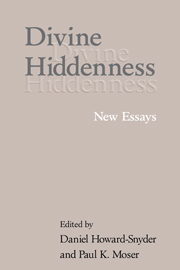Book contents
- Frontmatter
- Contents
- List of Contributors
- Introduction: The Hiddenness of God
- 1 What Is the Problem of the Hiddenness of God?
- 2 What the Hiddenness of God Reveals: A Collaborative Discussion
- 3 Deus Absconditus
- 4 St. John of the Cross and the Necessity of Divine Hiddenness
- 5 Jonathan Edwards and the Hiddenness of God
- 6 Cognitive Idolatry and Divine Hiding
- 7 Divine Hiddenness: What Is the Problem?
- 8 A Kierkegaardian View of Divine Hiddenness
- 9 The Hiddenness of God: A Puzzle or a Real Problem?
- 10 Seeking But Not Believing: Confessions of a Practicing Agnostic
- 11 The Silence of the God Who Speaks
- Bibliography
- Index of Names
- Index of Subjects
9 - The Hiddenness of God: A Puzzle or a Real Problem?
Published online by Cambridge University Press: 10 November 2009
- Frontmatter
- Contents
- List of Contributors
- Introduction: The Hiddenness of God
- 1 What Is the Problem of the Hiddenness of God?
- 2 What the Hiddenness of God Reveals: A Collaborative Discussion
- 3 Deus Absconditus
- 4 St. John of the Cross and the Necessity of Divine Hiddenness
- 5 Jonathan Edwards and the Hiddenness of God
- 6 Cognitive Idolatry and Divine Hiding
- 7 Divine Hiddenness: What Is the Problem?
- 8 A Kierkegaardian View of Divine Hiddenness
- 9 The Hiddenness of God: A Puzzle or a Real Problem?
- 10 Seeking But Not Believing: Confessions of a Practicing Agnostic
- 11 The Silence of the God Who Speaks
- Bibliography
- Index of Names
- Index of Subjects
Summary
In philosophical circles such as ours, we have become accustomed to expressing our religious ideas, and offering our analyses and arguments regarding these ideas, in terms that are associated with what we call “theism.” I take this usage to be a convenient abbreviation. Perhaps we should better characterize the terms that we like to use and the concepts with which we operate as belonging to “monotheistic” discourse, rather than as simply being “theistic.” Moreover it should be noted that our discussions almost invariably relate to monotheism of a very specific type, such as the type that has become foundational in all the current religious traditions which are the successors of the Hebrew scriptures, namely, Christianity, Islam, and Judaism. Because this is so, there are two things that we shall do well to take into consideration. First of all, we must note that the theological discussions within these three great historical traditions have sometimes been more inclusive and of wider range than what is just contained in these simple monotheistic terms, no matter how foundational these terms may be. Each of the traditions has included philosophical currents and mystical movements that have modified, in different ways, the basic concepts behind the skeletal monotheistic terms with which they have operated. Of this we shall speak more later on. Second, we must recognize that when, in the course of our philosophic discussions, we do formulate our ideas in the simple monotheistic terms, as these are understood by the ordinary believers within those religious traditions, we do so at a cost.
- Type
- Chapter
- Information
- Divine HiddennessNew Essays, pp. 181 - 196Publisher: Cambridge University PressPrint publication year: 2001



